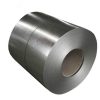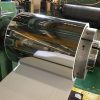304L Stainless Steel Coil/Strip Description
304L stainless steel coil is a variant of 304 stainless steel coil with a lower carbon content and is used where welding is involved. The lower carbon content minimizes the precipitation of carbides in the heat-affected zone close to the weld, and the precipitation of carbides may lead to intergranular corrosion of stainless steel in certain settings. Basically, using 304L spares the need to anneal weld joints prior to using the completed metal form, saving time and effort. Generally speaking, both 304 and 304L stainless steel coils can be used for many of the same applications. The differences are often minor enough that one isn’t considered massively more useful over the other. 304L stainless steel coil is widely used in fields such as food processing equipment, building materials, automobile parts.
Product Parameters
| Product Name | 304L Stainless Steel Coil/Strip |
| Type | Steel Coil/Strip |
| Thickness | 2.5mm-10.0mm |
| Length | 2000mm, 2440mm, 3000mm, 5800mm, 6000mm, etc. |
| Width | 610mm-2000mm |
| Standard | ASTM, AISI, JIS, GB, DIN, EN, etc. |
| Surface | BA, 2B, NO.1, NO.4, 4K, HL, 8K, etc. |
| Scope of Application | Widely used in high temperature and electrical industry, medical equipment construction, chemical, food industry, agriculture and ship parts, food and beverage packaging, Kitchen supplies, trains, airplanes, conveyor belts, vehicles, bolts, nuts, springs and screens, etc. |
| Certificate | ISO, SGS, BV, etc. |
| Production Technology | Hot Rolling, Cold Rolling |
| Edge Processing | Edging, Trimming |
Chemical Composition
| C | Si | Mn | Cr | Ni | S | P |
| ≤ 0.03 | ≤1.0 | ≤ 2.0 | 18.0~20.0 | 8.0~12.0 | ≤ 0.03 | ≤ 0.035 |
Mechanical Properties
| Tensile Strength Kb (MPa) | Yield Strength σ0.2 (MPa) | Elongation D5 (%) | Hardness |
| ≥ 520 | ≥ 205 | ≥ 40 | ≤ 187HB ;≤ 90HRB;≤ 200HV |
Physical Performance
| Density(g/cm³) | Modulus of Elasticity(Gpa) | Coefficient of Thermal Expansion(10-6/°C) | Coefficient of Thermal Conductivity(W/m*K) | Resistivity(ΜΩ. cm) |
| 8.03 | 193 | 16.9 | 16.2 | 72 |









